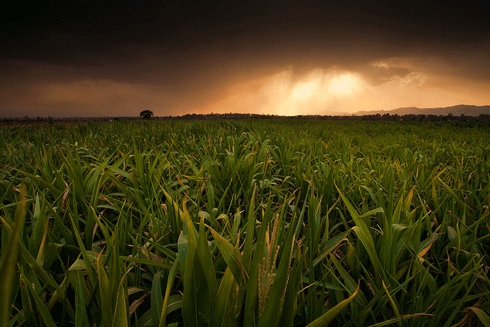
|
Published: 12 March 2013
Water stress, not heat, will cut yields under global warming
The effect that global warming will have on plants is now better understood thanks to advanced modelling provided by one of Australia's leading crop scientists.
For more than a decade, the University of Queensland's Professor Graeme Hammer, working for the Queensland Alliance for Agriculture and Food Innovation (QAAFI), has been developing increasingly sophisticated computer models to predict the growth and yield of agricultural crops.
In a paper just published in Nature, Professor Hammer and his colleagues have demonstrated that the anticipated increase in temperature associated with global warming is not directly linked to an expected decline in yield.
Previously it has been accepted wisdom that the yield losses being experienced by maize growers during hot seasons in the American mid-west were attributable to temperature increases.
The modelling study has shown that it is the associated increase in the evaporative demand for water – causing increased plant water use – that will ultimately cause the decline in crop yield. It is not a direct effect of heat stress on plant organs from the increase in temperature.
‘These two factors are often related, but until now we were simply attributing projected yield declines to increases in temperature and heat stress – and it's more complex than that,’ Professor Hammer said.
‘Our computer models are able to separate the mechanisms and explain what is actually going on.
‘Increasing temperatures mean increasing demand for water and so greater plant water use and ultimately more water stress during the crop life cycle.
‘A good human analogy would be to imagine someone standing in a desert. You would start to sweat more as the temperature increased and more rapidly use up your reserves of water.
‘It's a relatively simple concept, but one that has been overlooked until now.’
Being able to accurately predict declines in the maize harvest and explain their physiological basis is a reassuring validation of Professor Hammer's crop models.
Historical data used in the study was drawn from locations across the American mid-west spanning nearly 50 years.
Source: UQ




